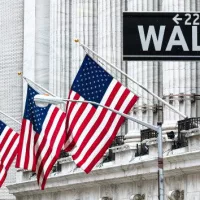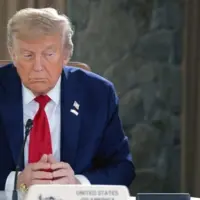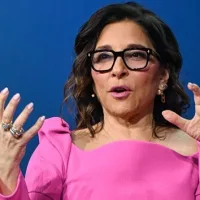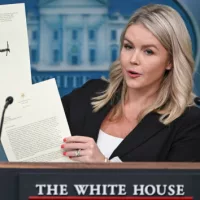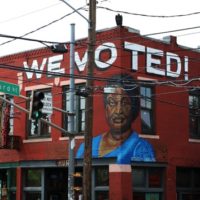
(ATLANTA) — When Michelle Lockhart was a teenager in Atlanta, she had to work two jobs — as a camp counselor and fast-food worker — to take care of her family.
She said her mother became disabled at that time due to a brain tumor, but it took months of cutting through red tape to qualify for desperately needed federal assistance.
If they had gotten more help then, “I could have focused on going to college and doing what people my age were doing: going to prom and enjoying their teen years,” Lockhart, now 41, told ABC News.
In the early months of this year, 650 Black women across Georgia — a demographic hit particularly hard by poverty — will get some of that help. Payments of $850 per month will roll out over the next two years in one of the biggest guaranteed income experiments in the country. Some participants in the $13 million initiative may receive lump sum payments totaling the same amount they would have received over two years. For now, the process of inviting and selecting participants is ongoing.
The program will run alongside Atlanta’s own basic income program which plans to serve about 300 residents that live below 200% of the federal poverty line. The initiative is currently working on making its first round of payments to the starting cohort of 25 participants, according to Mayor Keisha Lance Bottoms’ office.
Guaranteed income programs like these have seen a resurgence in recent years amid attempts to address racial and economic equality and reduce poverty. The scope can be either targeted or universal. They have had successes, but some critics say these initiatives have to be multifaceted to work and address the nuances of poverty. Others claim it will stop people from working (though the claim has been debunked) or be too expensive to maintain.
As a community advocate and member of the Old Fourth Ward Economic Security Task Force, Lockhart said many of her neighbors continue to experience similar hardships, despite working day and night in an effort to escape poverty. many of her neighbors continue to experience similar hardships, despite working day and night in an effort to escape poverty.
“Everybody’s on this hamster wheel,” Lockhart said. “They’re working two or three jobs … they’re working low wage jobs, but they’re still in poverty.”
Burden on communities of color
Black residents in Atlanta are more four times as likely to be living under the federal poverty line than their white neighbors, with 46% of Black households earning below $25,000 a year, according to recent research by the Old Fourth Ward Economic Security Task Force.
Some 38% of Black women and 26% of Black men in the city are living in poverty, compared to 8% of white women and 5% of white men in the same city, the task force reports.
“We’re working, we’re tired, we’re stressed,” Lockhart said. “With an extra $850 a month, people will be able to enjoy the sunlight and will be able to spend more time with their babies.”
Hope Wollensack, the executive director of the Georgia Resilience & Opportunity Fund, said the program is just the tip of the iceberg in terms of what is needed to address inequality.
“It’ll take a multifaceted approach — and probably many different policies — to even begin to address the racial wealth gap,” she said. “But we do know that stabilizing one’s income can be a powerful tool not only to improve one’s material circumstances in the short term and to improve quality of life and opportunities but also to enable individuals across the board to plan for the long term.”
The program, called “In Her Hands,” was shaped by discussions and surveys from community members that examined the causes of economic insecurity and wealth disparities in the city.
The project, run by the Georgia Resilience & Opportunity Fund, is an initiative from the Atlanta City Council, as well as the nonprofit cash assistance service GiveDirectly. It will begin rolling out in the Old Fourth Ward, the childhood neighborhood of civil rights leader Martin Luther King Jr., who was a fierce advocate for universal basic income as a way of addressing racial wealth inequities.
“We have economic insecurity that is pervasive and it’s the result of decades of policies, if not more, that have made it harder for the majority of Americans to get ahead,” Wollensack said.
The ability to access quality education, transportation and higher-paying jobs, the burden of childcare or predatory debt — factors like these, Wollensack said, are also more likely to burden communities of color.
Poverty and food insecurity can impact a community’s physical and mental health, and is considered one “of the most serious and costly health problems,” according to the Food Research & Action Center, a national nonprofit research organization working to eradicate poverty.
‘Hard to budget from zero’
Cash assistance and guaranteed income have been repeatedly proven to be a major force against poverty, according to researchers at the Columbia University, Center on Poverty & Social Policy.
Past studies and research has shown evidence that basic income experiments improved the happiness and health of its recipients and appeared to affect crime rates in the regions where it was implemented.
The program won’t offer any financial literacy courses and advise how participants will use the money. Wollensack says that, in surveying and researching the community and its financial needs, people can be trusted to make the right choices using their resources, but don’t have a lot of resources to start with.
“It’s hard to budget from zero,” Wollensack said. “In fact, we’ve seen oftentimes community members with some of the fewest resources are the most resilient and resourceful.”
She added, “Instead of viewing communities that may have experienced cash shortfalls as a deficit, we actually know and believe that these communities were huge assets.”
Lockhart said she expects to see the effects of the income boost almost instantaneously.
She says that when the COVID-19 stimulus reached the bank accounts of Old Fourth Ward residents, she saw a mood shift among her neighbors. She says people were out and chatting with neighbors, engaging with neighborhood businesses — the weight of financial stress lessened for just a while.
“They want to get out and work. They want to start their own businesses. They want to spend more time with their children,” Lockhart said “This will help slow people down a little bit so that they can focus and center themselves and center their energy right.”
Copyright © 2022, ABC Audio. All rights reserved.






